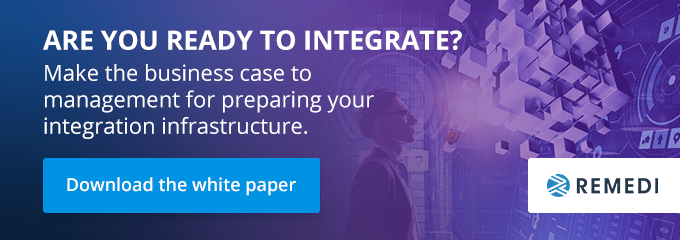
Electronic Data Interchange (EDI) refers to the electronic data exchange in standardized formats between businesses. EDI replaced legacy, paper-based processes. EDI has an important role in modern business operations. Through their use of EDI, companies can reduce errors in document exchange, streamline a multitude of business processes, and improve relationships with trading partners.
Despite the benefits EDI offers, businesses still face challenges when implementing and managing EDI systems. EDI standards and protocols are rather complex because they vary across industries and also by specific trading partners. The initial setup cost and required resources to integrate EDI systems with existing internal systems present another hurdle.
Integration Complexities
It can be challenging for businesses to integrate EDI with their existing systems and workflows. One main challenge is ensuring that the proprietary formats of an organization’s internal software systems are compatible with external EDI standards. Accurate data exchange is dependent on precise mapping between the proprietary data formats and EDI formats. The following tips for seamless integration include thorough planning and leveraging middleware solutions. Make sure you involve key stakeholders as early in the decision-making process as possible. Ensure you’re choosing the right middleware for your situation. Conduct a thorough analysis of your organization’s existing infrastructure and current processes.
Data Quality and Accuracy
It’s important to maintain high data quality in EDI transactions. There are a multitude of issues that can happen due to poor data quality. The issues largely fall into two categories: issues that directly impact customers such as billing errors and shipment delays and errors that impact your business such as issues meeting compliance and financial losses.
The following best practices for data validation and error handling help ensure accuracy. Conduct thorough performance and capacity planning to determine how well potential EDI solutions will perform. Additionally, your organization should establish robust validation rules to check the data for accuracy and completeness, not only before sending data but also before receiving data.
Partner Compliance and Onboarding
Companies have to carefully navigate the challenges of ensuring compliance with their trading partners' EDI requirements. Each trading partner will likely have different standards and processes including unique EDI formats and communication protocols.

Specific strategies for efficient partner onboarding and maintaining ongoing compliance can help facilitate this process. Organizations must understand partner requirements at the outset. It’s crucial to successful partner onboarding. Understand each partner’s preferred EDI standards, document types flowing through the EDI system, and any specific data requirements. Businesses should automate data entry whenever possible to reduce errors. Businesses should also consider using EDI-managed services; their specialized expertise can help your organization manage complex EDI requirements.
Scalability and Flexibility
Organizations have changing needs. Business growth will trigger increased transaction volumes, and so will the addition of new trading partners. EDI systems need to be scalable and flexible to accommodate this business growth.
Choosing scalable solutions and adopting flexible EDI standards makes a significant difference in accommodating business growth while maintaining existing, proven workflows. The EDI system you choose should have some level of customization. It’s not fully possible to know the specific requirements future trading partners might have. EDI systems that allow for customizations and extensions can accommodate these future concerns.

Security and Privacy Concerns
Businesses need to secure EDI transactions and protect sensitive data. The possible financial losses and fines imposed by regulators are too significant to minimize security and privacy concerns.. Due to the confidential and proprietary nature of data exchanged in EDI processes, EDI is a target for cyber threats. Ensuring confidentiality and data integrity will protect your company’s reputation and maintain trust with your trading partners.
The following best practices help implement robust security measures, including encryption and access controls. EDI relies on strong encryption protocols such as SSL. Another necessary component includes secure file transfer protocols.
Keeping Up with Evolving Standards
It can be a challenge for companies to stay up-to-date with evolving EDI standards and regulations. It’s not uncommon for EDI standards to be updated frequently to accommodate new advancements in technology, regulatory changes, or even simply new business practices. The key to avoiding disruption to your business is to keep up with these changes.

The following tips can help your organization stay informed and adapt to changes in a timely manner. Choose an EDI service provider to manage EDI for your organization. Their specialized expertise will ensure you’re kept informed of any industry changes. As part of your company’s overall risk management plan, make sure you conduct regular reviews of your EDI processes.
Cost Management
Another challenge organizations encounter is managing costs associated with EDI implementation and maintenance. Implementing EDI involves a substantial initial setup cost plus continual operational expenses and the need for regular updates.
It’s crucial to consider strategies that can help your organization optimize ROI. Before making a final decision evaluate different pricing models or, better yet, leverage managed services.
When evaluating the pricing models of various EDI providers, the key is choosing a pricing model that aligns with your organization’s needs, particularly pertaining to transaction volume. If you don’t have the in-house expertise to manage EDI processes, you should consider opting for managed EDI services instead of spending on hiring and training specialized experts.
Expert Insights and Case Studies
EDI experts offer valuable insights on overcoming common challenges. Their extensive experience implementing EDI solutions for varied clients across multiple industries results in a deep understanding of how to effectively implement EDI solutions. As a result, they often recommend developing a standardized onboarding process for all of your organization’s trading partners.
There is a lot to be gained from looking at case studies of businesses that have successfully navigated EDI challenges. Remedi assisted a turnkey logistics provider with transitioning to managed EDI services when their in-house EDI manager was approaching retirement. As a result of Remedi’s expertise, the company has simplified relationships with their existing trading partners, improved their ability to comply with new requirements from their current customers, and closed more deals.
Conclusion
The importance of addressing common EDI challenges for successful implementation and operation cannot be overstated. Compliance is a significant hurdle for many organizations, and it needs to be properly addressed in order to maintain reputation and avoid costly penalties. Successful implementation of an EDI system requires addressing common challenges, and by doing so, your organization can fully leverage the benefits of EDI.
Businesses benefit by adopting best practices and seeking expert guidance to optimize their EDI systems. EDI experts can make your partner onboarding more efficient and help your organization navigate complex regulatory changes.



